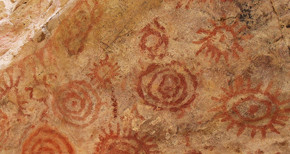The Society for American Archaeology is an international organization recognized as a leading voice in support of archaeology. The SAA is the go-to resource for archaeology and archaeological issues. Its leadership is comprised of highly trained and experienced archaeologists. and its members are on the forefront of cutting-edge research.
Archaeology captures the public's imagination, uncovers common origins, and helps us understand our shared past. TV shows, movies, books, and articles about archaeology and archaeologists are a constant hit in mainstream media. The SAA is committed to helping the media and entertainment industries portray archaeology responsibly and factually. The SAA invite inquiries from the media about the exciting research and work being done by SAA archaeologists, the practice of archaeology, and about issues related to policy that affect archaeology.
Under Threat: Section 106 of the National Historic Preservation Act Helps Save America’s History
Contact: gov_affairs@saa.org
Download the release: Section 106 of the NHPA is Under Threat--SAA Press Release--
Section 106 of the National Historic Preservation Act Helps Save America’s History; Now It’s Under Threat
Washington, DC—This October 15th, we celebrated the 58th anniversary of NHPA, a law that helps the United States record and preserve its cultural history. NHPA’s ability to safeguard our national heritage is now under immediate threat. The Society for American Archaeology (SAA) wants to celebrate the cultural and historic places that were recorded and saved under NHPA, and those yet to be uncovered. Unfortunately, in response to misleading claims that the NHPA hinders development, the Advisory Council on Historic Preservation (ACHP) is proposing a new regulatory process that would make our historic and archaeological resources vulnerable to destruction with no consideration or recourse by tribal and state authorities or local communities.
Under Section 106 of the NHPA, federal agencies must take into account effects on historic and archaeological sites that face potential loss or damage from federal and federally-sponsored development projects. Agencies carry out historic preservation reviews of affected lands to determine if the project will harm historically significant resources. Those reviews require the involvement of State Historic Preservation Offices (SHPOs), Tribal Historic Preservation Offices (THPOs), federally recognized Indian Tribes, and Native Hawaiian Organizations (NHOs), who give a voice to critically important resources. SHPOs, THPOs, Tribes, and NHOs advise and track agencies' compliance with Section 106. Local residents can also participate.
Through this process artifacts from the first battle of the American Revolution were located in Lexington, Massachusetts, and Mobile, Alabama is telling its story through the Mobile River Bridge Project archaeological investigations, from Native American and colonial settlements to the African-American history of the city
The ACHP is tasked with drafting and overseeing the implementation of the NHPA’s regulations. Unfortunately, the ACHP is considering implementing a broad Program Comment on Accessible, Climate-Resilient, and Connected Communities that would allow federal agencies to opt out of conducting historic preservation reviews when it comes federal energy, housing and transportation building projects. This new policy would silence the voices of the states, tribes, and communities in historic preservation. Such an outcome is the opposite of what Congress and President Lyndon Johnson intended and precisely the opposite of what the law itself mandates.
If approved, this program comment could be used to unilaterally override all existing programmatic agreements, invalidating the previously negotiated terms that agencies, states, tribes, and local communities worked together to create. Not only would this violate contract law, but it would also result in massive confusion and delays for current undertakings and devastating losses of time and money for the federal agencies managing those projects, especially those concerning the transportation sector, because inadvertent discoveries that lead to work stoppages are guaranteed to increase.
Thousands of known archaeological sites and sacred cultural places across the nation are being destroyed by the effects of climate change. Countless more will be destroyed before they can even be documented. The proposed ACHP policy would expose these sites to even more adverse effects from climate change. The notion that the exemption would somehow contribute to climate resiliency counters our experience with the damaging impacts of flooding, wildfires, and hurricanes. The presence of archaeological, cultural, and historical sites not reviewed under the ACHP proposal will result in the loss of these sites for current and future generations.



